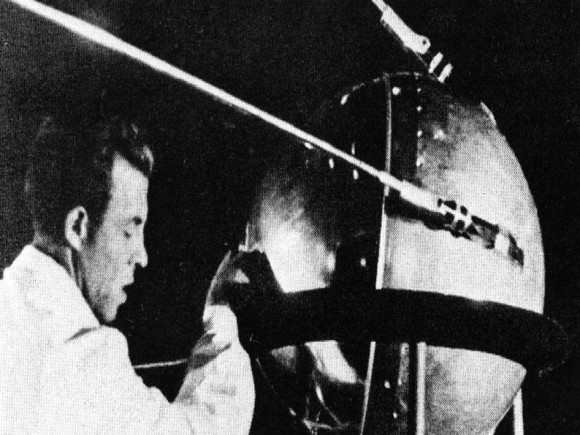| Sputnik means "traveling companion of the Earth" |
October 4, 1957, I was 10 years old. I distinctly remember Sputnik and going outside my house to see the satellite pass overhead. Wow, how the world has changed since then. Most of the changes have not been for the better but Sputnik ushered in a whole new world of communication and shrank the world a thousand times over. On the date above, the Soviet Union
lauthed Sputnik I, the first artificial satellite to orbit the Earth.
According to many space historians, the Space Age began on this date.
It was a polished metal sphere,
made of aluminum alloy. It was 58 centimeters (23 inches) in diameter – about
the size of a beach ball – and weighed just 184 pounds. Its four external radio
antennae were meant to broadcast radio pulses. And broadcast they did. For 21
days in 1957, people around the globe heard Sputnik’s unassuming beep beep on the radio.
The pressurized sphere had five primary science objectives: test
a process for placing an artificial “moon” into Earth orbit; provide
information on the density of Earth’s atmosphere, calculated from Sputnik’s
lifetime in orbit; test radio and optical methods of orbital tracking;
determine the effects of radio wave propagation though Earth’s atmosphere; and
check principles of pressurization that could be used on Earth-orbiting
satellites. Clearly, the next step was to place living things in space.
Sputnik’s beeping was a symbol not only of Soviet Russia’s
remarkable accomplishment, but also of what many immediately assumed was
Russia’s superiority in space. The American public feared that the Soviets’
ability to launch satellites also translated into the capability to launch
ballistic missiles that could carry nuclear weapons from Europe to the U.S.
Then the Soviets struck again. On November 3, 1957, they
launched Sputnik II, this time carrying a much heavier payload, including a dog
named Laika.
 |
| Russia's Sputnik |
Sputnik I and Sputnik II sent shockwaves around the world.
American political leadership scrambled to catch up. Ultimately, that extra
push resulted in the United States sending the first astronauts to walk on the
moon, on July 20, 1969.
Bottom line: On October 4, 1957, the Soviet Union launched the
Sputnik 1 satellite into Earth orbit, and the Space Age began and our lives changed forever.


No comments:
Post a Comment